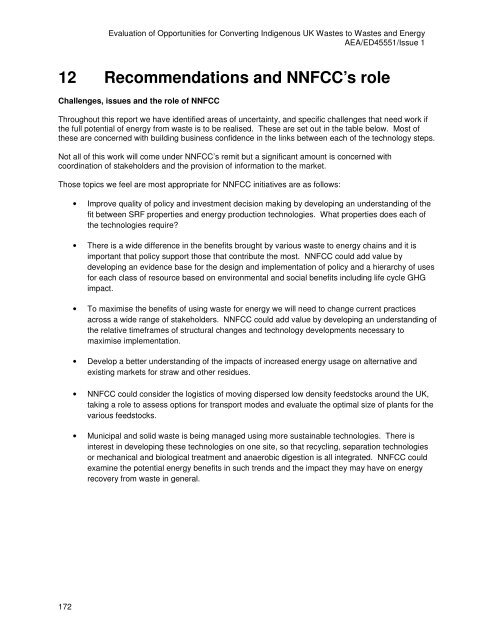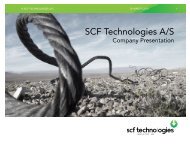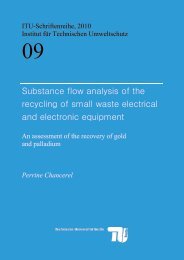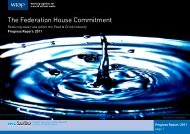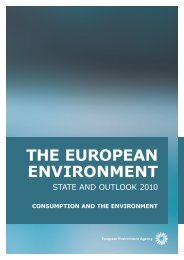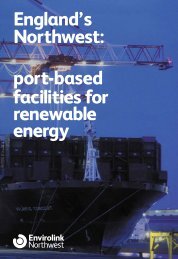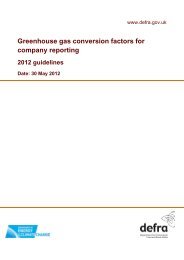to read the full report - Ecolateral by Peter Jones
to read the full report - Ecolateral by Peter Jones
to read the full report - Ecolateral by Peter Jones
Create successful ePaper yourself
Turn your PDF publications into a flip-book with our unique Google optimized e-Paper software.
172<br />
Evaluation of Opportunities for Converting Indigenous UK Wastes <strong>to</strong> Wastes and Energy<br />
AEA/ED45551/Issue 1<br />
12 Recommendations and NNFCC’s role<br />
Challenges, issues and <strong>the</strong> role of NNFCC<br />
Throughout this <strong>report</strong> we have identified areas of uncertainty, and specific challenges that need work if<br />
<strong>the</strong> <strong>full</strong> potential of energy from waste is <strong>to</strong> be realised. These are set out in <strong>the</strong> table below. Most of<br />
<strong>the</strong>se are concerned with building business confidence in <strong>the</strong> links between each of <strong>the</strong> technology steps.<br />
Not all of this work will come under NNFCC’s remit but a significant amount is concerned with<br />
coordination of stakeholders and <strong>the</strong> provision of information <strong>to</strong> <strong>the</strong> market.<br />
Those <strong>to</strong>pics we feel are most appropriate for NNFCC initiatives are as follows:<br />
• Improve quality of policy and investment decision making <strong>by</strong> developing an understanding of <strong>the</strong><br />
fit between SRF properties and energy production technologies. What properties does each of<br />
<strong>the</strong> technologies require?<br />
• There is a wide difference in <strong>the</strong> benefits brought <strong>by</strong> various waste <strong>to</strong> energy chains and it is<br />
important that policy support those that contribute <strong>the</strong> most. NNFCC could add value <strong>by</strong><br />
developing an evidence base for <strong>the</strong> design and implementation of policy and a hierarchy of uses<br />
for each class of resource based on environmental and social benefits including life cycle GHG<br />
impact.<br />
• To maximise <strong>the</strong> benefits of using waste for energy we will need <strong>to</strong> change current practices<br />
across a wide range of stakeholders. NNFCC could add value <strong>by</strong> developing an understanding of<br />
<strong>the</strong> relative timeframes of structural changes and technology developments necessary <strong>to</strong><br />
maximise implementation.<br />
• Develop a better understanding of <strong>the</strong> impacts of increased energy usage on alternative and<br />
existing markets for straw and o<strong>the</strong>r residues.<br />
• NNFCC could consider <strong>the</strong> logistics of moving dispersed low density feeds<strong>to</strong>cks around <strong>the</strong> UK,<br />
taking a role <strong>to</strong> assess options for transport modes and evaluate <strong>the</strong> optimal size of plants for <strong>the</strong><br />
various feeds<strong>to</strong>cks.<br />
• Municipal and solid waste is being managed using more sustainable technologies. There is<br />
interest in developing <strong>the</strong>se technologies on one site, so that recycling, separation technologies<br />
or mechanical and biological treatment and anaerobic digestion is all integrated. NNFCC could<br />
examine <strong>the</strong> potential energy benefits in such trends and <strong>the</strong> impact <strong>the</strong>y may have on energy<br />
recovery from waste in general.


